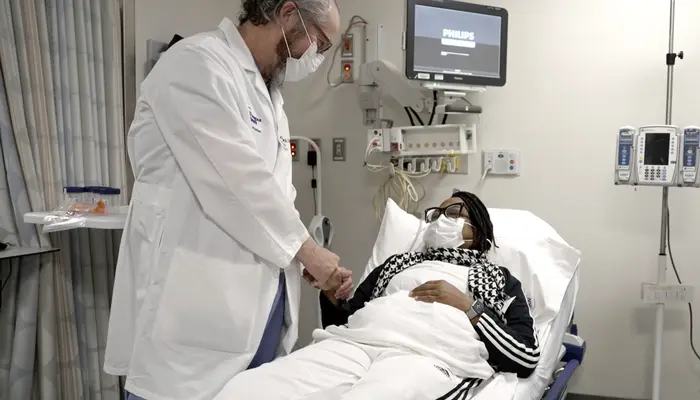
An Alabama woman, Towana Looney, is enjoying a new lease on life after receiving a gene-edited pig kidney transplant. The groundbreaking surgery has freed her from eight years of dialysis, offering hope to thousands awaiting transplants. Looney, 53, is the fifth American to receive a gene-altered pig organ but the first to show promising long-term progress.
A Life-Changing Surgery
Looney’s kidney transplant, performed on November 25 at NYU Langone Health, marks a significant step in xenotransplantation — the use of animal organs in humans. Dr. Robert Montgomery, who led the surgery, shared the procedure’s success: the kidney turned pink and started working immediately.
“It’s like a new beginning,” Looney said. “The energy I have now is amazing. To feel a working kidney again is unbelievable.”
Her recovery has been remarkably smooth. Discharged just 11 days after surgery, she continues rehabilitation with careful monitoring of her vital signs and medication adjustments. Doctors expect her to return home to Alabama in three months.
The Challenge of Finding a Kidney Match
Looney’s path to this moment was far from easy. She first donated a kidney to her mother in 1999, but pregnancy complications later damaged her remaining kidney. As a result, Looney spent nearly a decade on dialysis and seven years on the transplant list.
Her situation became even more challenging because she developed rare antibodies, making it nearly impossible to find a compatible human kidney. “She wasn’t a candidate for 99.99% of potential donors,” explained Dr. Jon LaPook, a medical correspondent.
Turning to Xenotransplantation
Looney’s case caught the attention of Dr. Jayme Locke, her original surgeon. Locke, now a federal transplant expert, worked to secure FDA permission for the emergency experimental procedure. Though the FDA initially hesitated, two gene-edited pig kidney transplants were performed earlier in 2024 on sicker patients, one at Massachusetts General Hospital and another at NYU Langone.
Read: WHO Urges Southeast Asia to Intensify Fight Against Tuberculosis
Both patients ultimately died, though their deaths were unrelated to organ rejection. These setbacks did not discourage Looney. She pushed forward, convinced that trying the innovative procedure could make a difference — not just for her but for others.
Gene-Editing Makes the Difference
The kidney used in Looney’s surgery came from a pig genetically altered by Blacksburg-based Revivicor. Scientists edited 10 genes to make the pig organ more compatible with human biology, significantly reducing the risk of rejection.
During surgery, the results were immediate. As Dr. Montgomery placed the kidney, it began producing urine, signaling its function.
A Promising Future for Transplants
Looney’s success offers new hope to more than 100,000 people on the U.S. transplant list, most of whom need kidneys. Thousands die waiting for organs, while many others do not qualify for transplants due to medical complications. Xenotransplantation may provide a life-saving solution.
Doctors remain cautiously optimistic. Looney continues to undergo daily checkups as her team carefully monitors her progress. “A lot of what we’re seeing, we’re seeing for the first time,” Dr. Montgomery explained.
Despite the risks, Looney embraces her role in advancing medical research. “Even if this kidney fails, doctors will learn from it,” she said.
Her determination, combined with scientific progress, could open the door to a future where gene-edited animal organs save countless lives.
Follow Day News on Google News, Instagram, YouTube, Facebook, Whats App, and TikTok for latest updates











